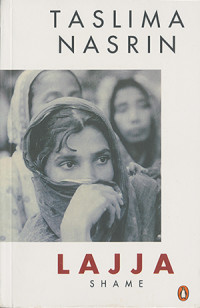Lajja
by Taslima Nasrin
This entry was created for the Fall 2014 semester by Brennan York.

Author Bio
Taslima Nasrin was born to a Muslim family in Eastern Pakistan in 1962- the area which would become Bangladesh in 1971. While she earned a medical degree, she began writing at the age of 13. After a few publications, she began writing columns for newspapers that supported women's rights and challenged Muslim religious doctrine. Her position was unrelenting; she believed that religion was outdated and should be replaced with a civil code that promoted equality. She began winning literary rewards in spite of some criticism. However, in 1990, Islamic fundamentalists began to demonstrate against her. The newspapers she worked for had their offices broken into, as well. She was forced to quit her job after the government said she would have to quit writing to keep it; they also took away her passport. In 1993, she published the novel "Lajja", which was banned by the Bengali government. Islamic Fundamentalists made death threats against her now, putting a price on her head. Over 300,000 of them gathered to petition for her to die, and strikes all across the country called for the same. After numerous complaints against her, the government eventually would issue a warrant for her arrest, charging her of hurting people's religious feelings. Nasrin went into hiding until she was granted bail, but was made to leave the country entirely. Since, she has tried living in India, but was forced from there because of threats from Islamic extremists again, going to Europe. Today, she lives in India again, in New Delhi.
Discussion Questions
- The name of the book is "Lajja", which translates to 'Shame' in Bengali. Is this title more indicative of the shame the Dutta family feels due to having to hide their identities as 'Hindus' or the shame that Sudhamoy would feel if they abandoned their country, Bangladesh, and fled to India?
- The characters in Lajja are fictional, but the events surrounding the book did take place. Throughout the novel, the author uses the characters to exposit facts from these events almost like a work of journalism. What effect does this have on the story and why is was banned by the Bengali government?
- What role does patriotism play in this novel, and why is Sudhamoy so adamant against leaving Bangladesh?
- The Duttas live in fear of persecution by Muslim extremists because they are identified as Hindus, yet Sudhamoy and Suranjan identify as atheists. What statement is the author making with these characters being threatened by the religious majority?
- Throughout the book, Suranjan loses hope of peacefully staying in Bangladesh, overwhelmed by violence and atrocities; he gets to the point where he wonders if life is pointless. What does this say about him as a character, as well as the Muslim extremists' violent reactions to the destruction of the Babri Masjid?

